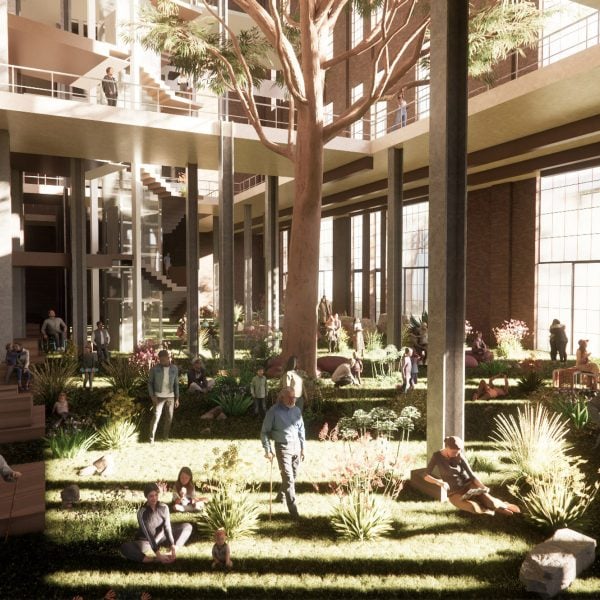[ad_1]
Dezeen School Shows: a former power station outside Sydney, reimagined to produce sustainable fashion is included in Dezeen’s latest school show by students at University of New South Wales Sydney.
Also included is an adaptive reuse of a brutalist 1970’s skyscraper and a biophilic public centre.
Institution: UNSW Sydney
School: School of Built Environment
Courses: Bachelor of Architectural Studies, Bachelor of Interior Architecture (Honours) and Master of Architecture
Tutors: Associate Prof Paul Hogben, Dr Sing D’Arcy, Shaowen Wang, Eva Lloyd, Associate Professor Bernadette Hardy, Dr Raffaele Pernice, Associate Prof Melonie Bayl-Smith, Prof Philip Thalis, Prof Rachel Neeson, Sue Harper, Mladen Prnjatović, Sebastian Grøgaard, Mark Szczerbicki, Prof David Sanderson, Renate Carius, Paul Berkemeier and Donna Kalish
School statement:
“At UNSW Built Environment we focus on architecture and design at every scale, from industrial-designed products to the architectural design of buildings and landscapes, up to urban and regional planning and policy.
“We place emphasis on sustainable design approaches that embrace circular thinking and adaptive reuse to achieve resilient and low carbon outcomes.
“Our social-impact design ethos seeks to meet the diverse needs of different groups, creating landscapes, buildings and products that are healthy and inclusive. We also equip students to use advanced digital tools and data, allowing them to make evidence-based decisions and develop smart ways of analysing and designing our world.
“Many of our student projects engage with ‘country’, which Associate Professor Bernadette (B) Hardy, a traditional owner of Dharug and Gamilaraay descent, redefines for First Nations people as a profound union of the physical and spiritual, deeply connected to the world’s oldest living culture.
“Studio design in the Bachelor of Interior Architecture shown below is co-led by Associate Professor Hardy with guidance from Uncle Tim Bishop (Murrawarri) and country as teacher (Dharug, Bidgigal, Gadigal and Wangal).
Students and staff have been entrusted with Aboriginal knowledge and culture (referred to as Indigenous Cultural Intellectual Property and Cultural Law/Lore) and permission is required for its reproduction.
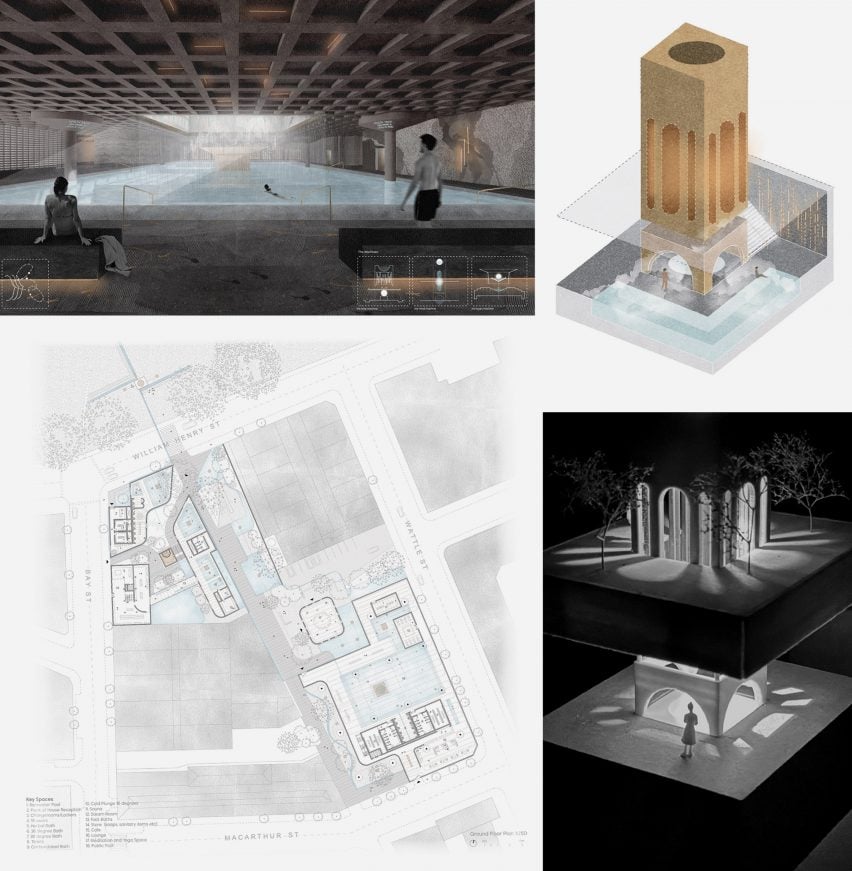
Submerge by Mouriya Senthilkumar
“The design comments on the heavy industrial history of the site and its workers by subverting the notion of ‘the machine’.
“The machine, which became synonymous with man, is separated and the worker is restored.
“The interplay of light and materials further create a suspension of time and the sound of water permeates the bathhouses and its path echoes the natural watercourse of Blackwattle Creek in inner-city Sydney.”
Student: Mouriya Senthilkumar
Course: Master of Architecture
Email: m.senthilkumar[at]student.unsw.edu.au
Tutors: Mark Szczerbicki, Renate Carius and David Sanderson
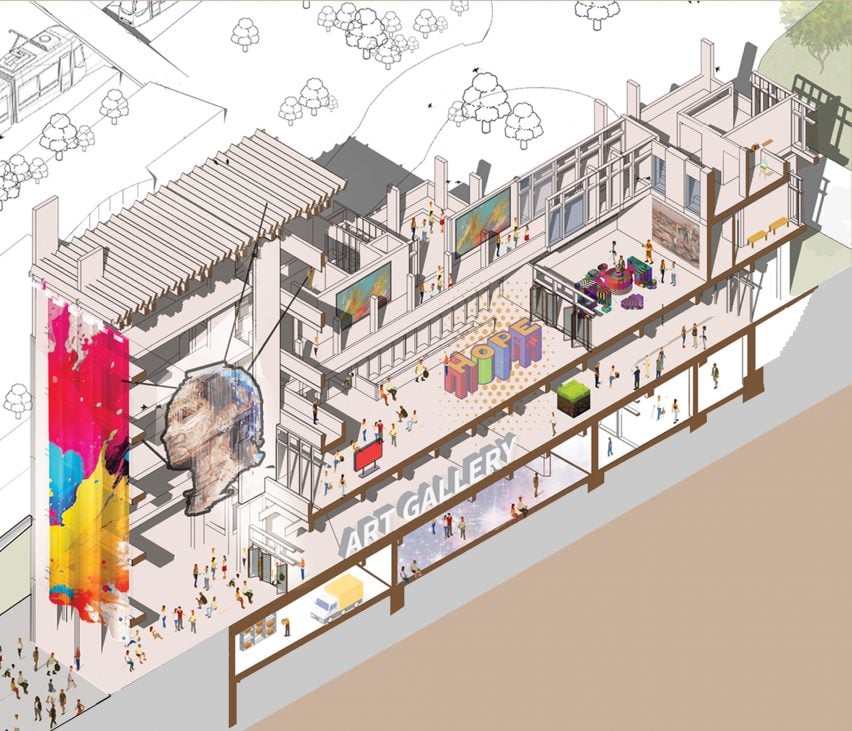
Art Passes Us By: Gordon Regional Cultural Exchange by John Kim-Ping Ng
“Art Passes Us By revitalises a community through a dynamic new art precinct, where a luminous gallery and flowing spaces unite culture and creativity, preserving local identity amidst rapid urban transformation.
“This harmonious blend of structure and art aims to foster connection and engagement within a renewed civic heart for Gordon, a northern suburb of Sydney.”
Student: John Kim-Ping Ng
Course: Master of Architecture
Email: john.ng[at]student.unsw.edu.au
Tutors: Shaowen Wang and Raffaele Pernice
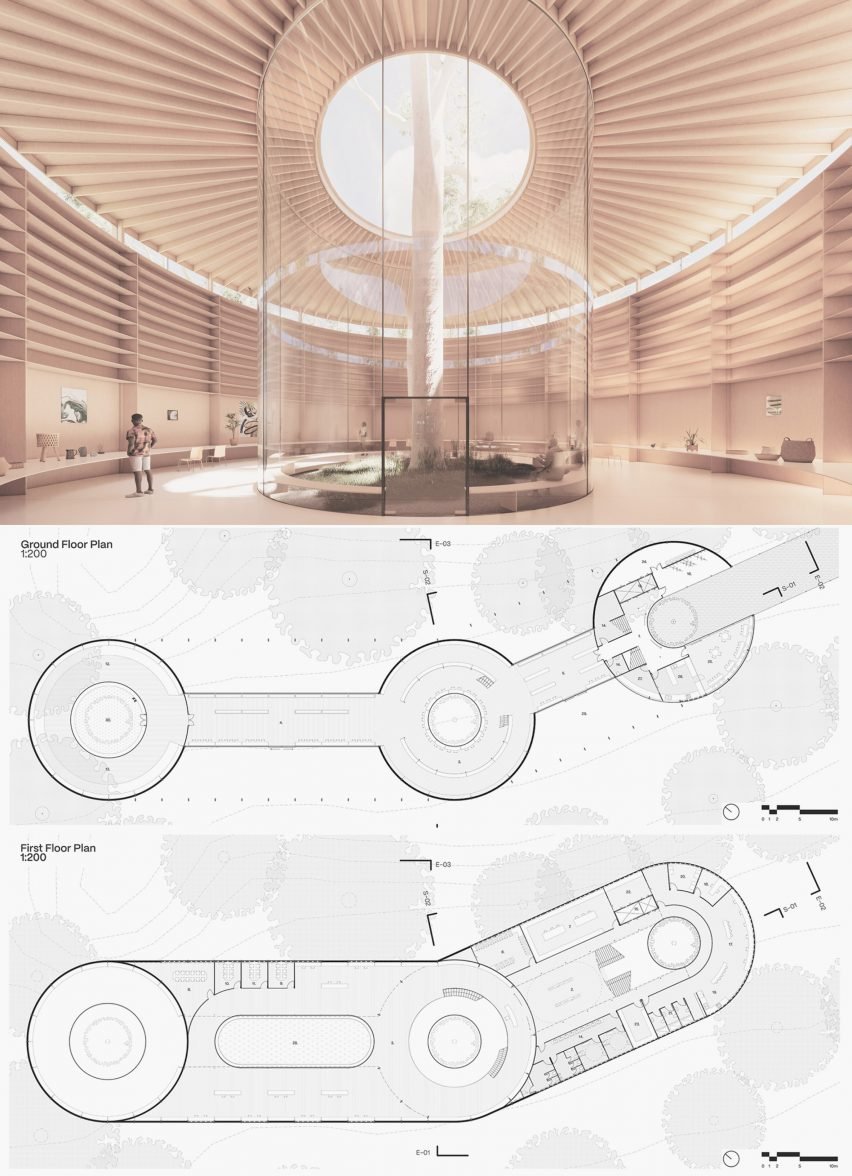
Perrenial by Lucas Easton
“Libraries are cultural pillars, preserving ideas that transcend generations.
“Perennial draws on the resilience of eucalyptus trees, which regrow from ashes after bushfires, symbolising how knowledge and culture endure and educate future generations.
“The design reflects Australia’s complex history with Indigenous people, encouraging shared learning and community growth.
“Centred around three eucalyptus trees, the courtyards integrate nature with activity, embodying the ever-present cycle of renewal and emphasising the enduring ties between place, culture and knowledge.”
Student: Lucas Easton
Course: Bachelor of Architectural Studies
Email: l.easton[at]student.unsw.edu.au
Tutors: Sue Harper and Rachel Neeson
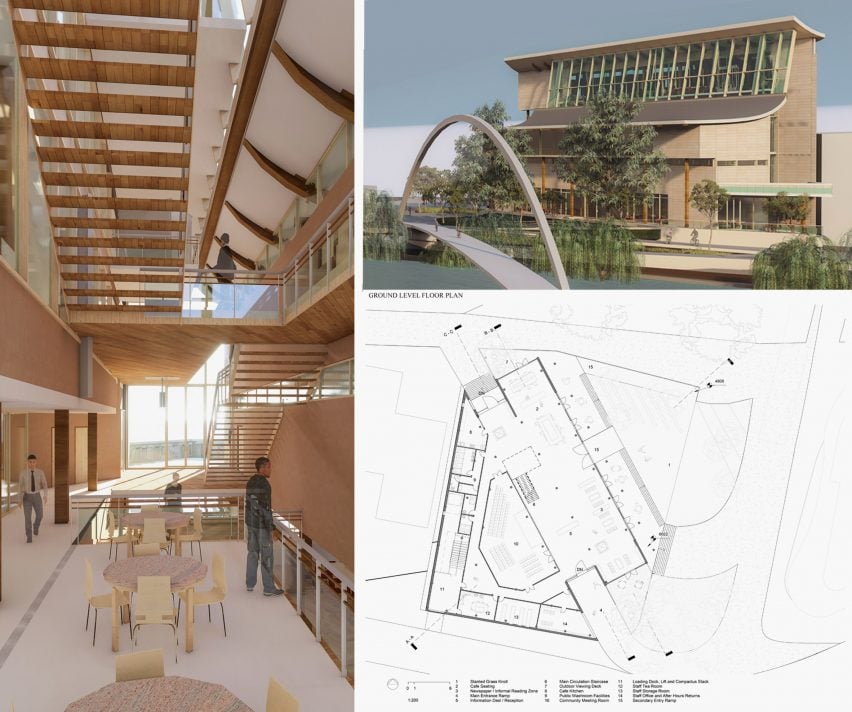
Confluence by Jenna Fisher
“Confluence is the act or process of merging. In this design for Rosehill Library in western Sydney, confluence becomes a motif.
The atrium allows a clear line of sight directly through the building from the nearby light-rail towards the bank of the Paramatta River.
“As such, the library itself is deemed a place of confluence, a place where past and present merge, imbued with a constant future-focused lens.”
Student: Jenna Fisher
Course: Bachelor of Architectural Studies
Email: jenna.fisher[at]student.unsw.edu.au
Tutors: Paul Berkemeier and Philip Thalis
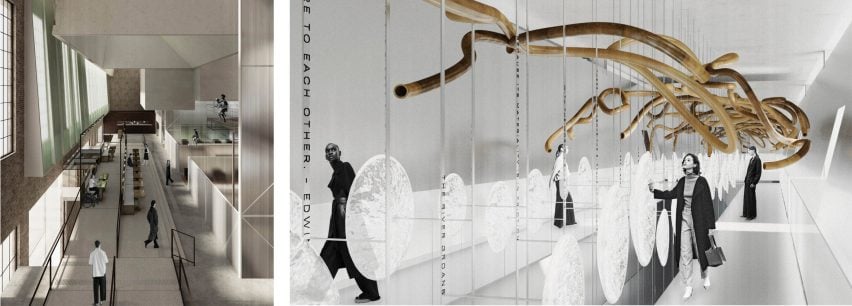
Ghost to Coast by Jessica Bae
“By prioritising perception over visual accuracy, Ghost to Coast generates understandings of country within the White Bay Power Station perceived through peripheral vision – that is never absolute and constantly subject to lost narratives.
“Obscured and fragmented morphologies of the dormant site become a method to destabilise conflicting histories and are superimposed by the sounds and tactility of water that have been ever-present on the site for healing, cleansing and ceremony.
“Users are invited to engage in an act of reciprocity to understand the importance of water and country through embodied reflection, subject to the lens of the imaginary and ephemeral.”
Student: Jessica Bae
Course: Bachelor of Interior Architecture (Honours)
Email: jessicabae019[at]gmail.com
Tutors: Eva Lloyd, Sing D’Arcy and Bernadette Hardy
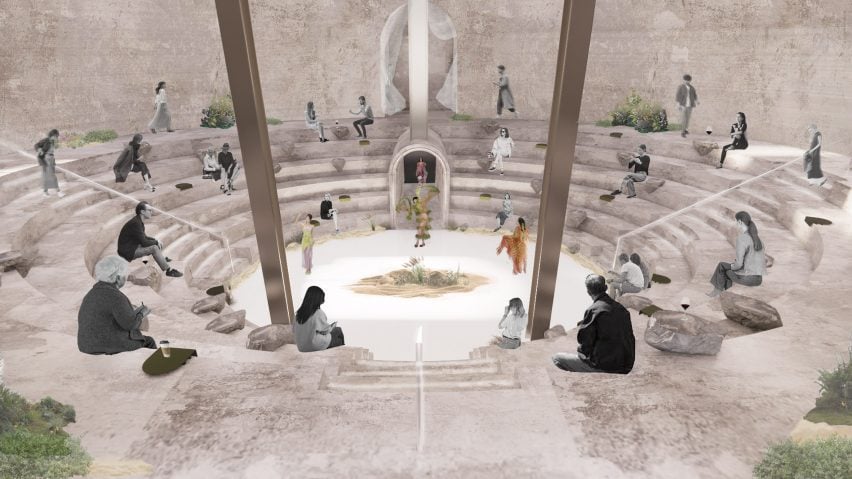
Threads by Michaela De Leon
Threads reimagines the White Bay Power Station as a vibrant community hub where fashion intersects with contemporary environmental concerns and the tactile essence of creation.
“As an adaptive reuse project, Threads weaves the site’s industrial past into a platform for sustainable fashion-making, performance and retail, celebrating the tactile connection between handcrafting and the natural rhythms of the land.
“By reviving skills lost to industrialisation and drawing inspiration from the textures, forms and stories of country, Threads invites re-examination of consumption patterns and intertwines the enduring value of craft, community and a care for Country in shaping a sustainable future.”
Student: Michaela De Leon
Course: Bachelor of Interior Architecture (Honours)
Email: mjacinta164[at]gmail.com
Tutors: Eva Lloyd, Sing D’Arcy and Bernadette Hardy
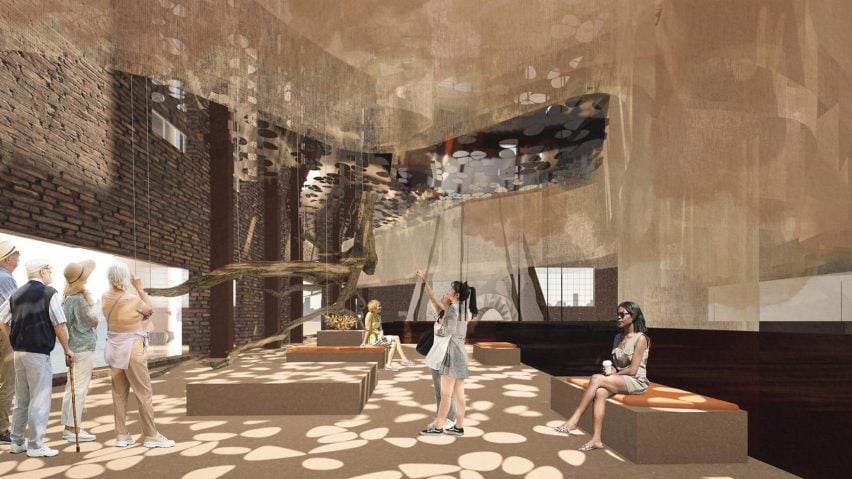
Mineral: A call to Country by Sydney Vasin
“An arts and culture centre to unlearn and flourish, through the human and more than human experience, rooted in cultural values that will ultimately become our collective identity – a love letter to country.
“The centre is a place of holding, meeting, un-learning, gathering and ceremony.
“It celebrates traditional and contemporary Indigenous culture, oral histories and heritage of place.
“It seeks to regenerate connections with country to share a common journey of collective healing that will inspire for generations to come.”
Student: Sydney Vasin
Course: Bachelor of Interior Architecture (Honours)
Email: sydneyvasin[at]gmail.com
Tutors: Eva Lloyd, Sing D’Arcy, Bernadette Hardy and Donna Kalish
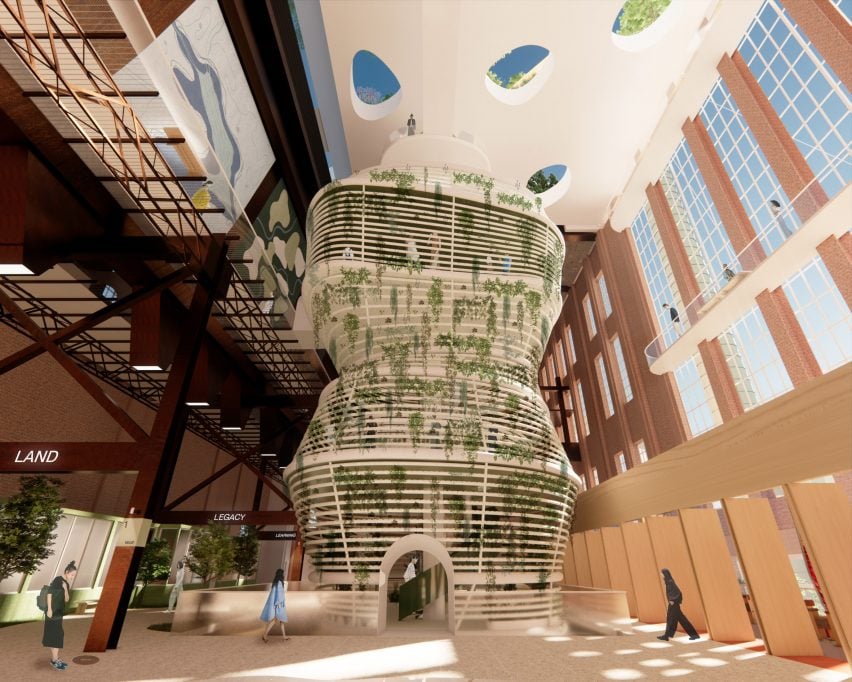
The Museum of Remembering Endeavours and Reinvigorating Environments (More) by Jessica Tunggono
“More is a living legacy precinct from which life grows and memories are shared, creating a more than human connection for generations to come.
“Driven by the site’s history of taking from country, lost generational stories and the lack of space for cultural work, the themes of land, legacy, and learning became the identity of the project.
“By reclaiming the land through green architecture, More transforms the White Bay Power Station into a vibrant community space that celebrates legacy and ignites learning.”
Student: Jessica Tunggono
Course: Bachelor of Interior Architecture (Honours)
Email: jejastuau[at]gmail.com
Tutors: Eva Lloyd, Sing D’Arcy and Bernadette Hardy
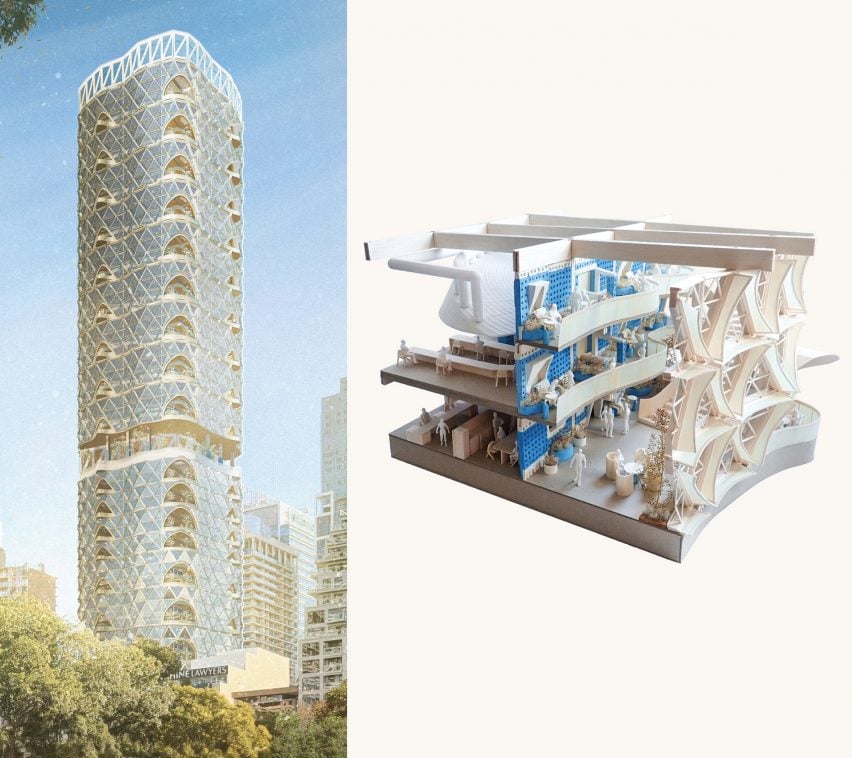
Morals of Mimesis by Henrick Michael
“Abstracting the natural analogues of Sydney Harbour’s near-extinct oyster reef ecology, this design adaptively reuses a 1977 brutalist skyscraper to create a new salutogenic justice centre.
“In creating a multisensory environment, the project harmonises architectural form with ecological function, using passive biomimetic systems to enhance user comfort, experience and ecological sustainability.”
Student: Henrick Michael
Course: Master of Architecture
Email: h.michael[at]unsw.edu.au
Tutors: Mladen Prnjatović and Sebastian Grøgaard
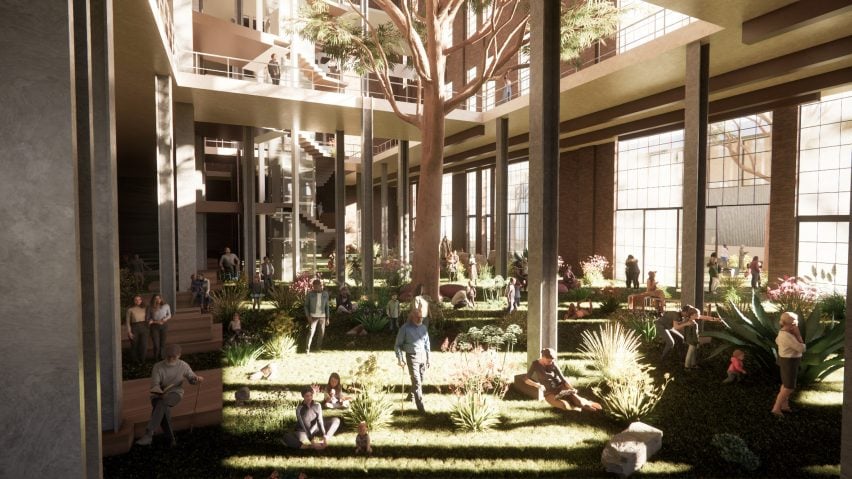
The Meeting Place by Jade Hodge
“The story of Warami for the Indigenous and broader community: the design is about agency and relationality; you go where country calls you.
“The Meeting Place is a more-than-human gathering space of storytelling and healing.
“The project opens boundaries of interior, architecture and landscape through a biophilic public centre informed by the knowledge learnt walking and sensing country and learning about culture through yarning with knowledge holders.”
Student: Jade Hodge
Course: Bachelor of Interior Architecture (Honours)
Email: jadehodge6[at]gmail.com
Tutors: Eva Lloyd, Dr Sing D’Arcy and Bernadette Hardy
Partnership content
This school show is a partnership between Dezeen and the University of New South Wales Sydney. Find out more about Dezeen partnership content here.
[ad_2]
Source link

